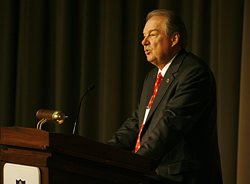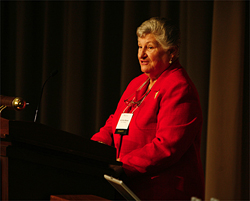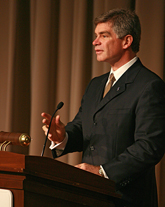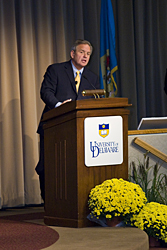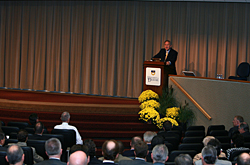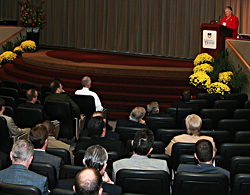
“I think this conference was a great success,” UD President Patrick Harker said. “It brought together key people from a variety of fields to begin to lay the groundwork for new partnerships throughout the state. The University is committed to a continuing effort to build partnerships, so that knowledge developed here might be commercialized for the marketplace.”
UD Provost Dan Rich welcomed the participants and introduced Jim Wolfe, president of the Delaware State Chamber of Commerce. Earlier this year, Rich led a task force on economic development in the state that laid out the University's contributions and recommended fresh opportunities, including events such as that held Friday.
Wolfe pointed out some of the challenges facing Delaware-- the impending shut downs of Chrysler and General Motors plants, the ripple effect of the real estate slowdown and the presence of casinos in neighboring states, which could lead to a decline in state revenues. But, he said, the Nov. 2 conference could begin a new era of success based on knowledge, fresh ideas, capability and determination through partnerships. He thanked Harker for organizing the conference, pointing out he had served as one of the greatest deans of one of the premier business schools, Wharton at the University of Pennsylvania, and was now leading UD, one of the top public universities.Wolfe introduced Gov. Ruth Ann Minner, calling her an effective partner in policy initiatives, making Delaware “the best state in which to do business.”
Minner talked about the importance of partnerships, not just for tomorrow but the future, and working together to benefit everyone.
She said the Delaware economy is strong, comparing it to California, which is financed through borrowing, pointing out that Delaware is one of only seven states to have a triple A bond rating.She discussed educational opportunities for students to provide an educated workforce in Delaware, from the implementation of full-time kindergarten to the SEED (Student Excellence Equals Degree) Program, offering Delaware students opportunities to work for associate degrees. She also spoke highly of Charles Elson, Edgar S. Woolard Jr. Chair in Corporate Governance and director of the John L. Weinberg Center for Corporate Governance in UD's Lerner College of Business and Economics, and the center's national reputation and influence on important laws affecting corporations.
Minner also spoke on collaborations at the Delaware Technology Park and cited the UD Delaware Biotechnology Institute, pointing out that its projects included bioterrorism research and poultry research, including avian flu.
It's part of the “Delaware way,” working together so that what needs to happen can happen, she said, citing a new program that offers tax credits as an incentive to companies that create 50 new jobs for employees.The goal is to keep Delaware “competitive, regionally, nationally and globally” through partnerships and to keep Delaware the best place to live, work and raise a family, Minner said.
Harker thanked Gov. Minner and introduced the conference keynote speaker, Chad Holliday, who became DuPont Co. CEO in 1998 and chair in 1999. He is author of Walking the Talk: The Business Case for Sustainable Development. Among his appointments, Holliday has chaired the Board of directors of Catalyst, expanding opportunities for women; chairs the U.S. Council on Competitiveness; and is a founding member of the International Business Council.
Holliday's talk centered on Rising Above the Gathering Storm: Energizing and Employing America for a Brighter Future, a report from the National Academies on the state of math and science education in the country.
Holliday had six points about issues concerning maintaining the standard of living in the U.S, in a highly competitive world. The first was “What's the Fuss?” as the country is still first, but he projected that in 10 years if we did nothing, this would change.
His second point was that more emphasis is needed on funding for research and development, especially research. He spoke about being in Shanghai and meeting the vice mayor of research, who took him on a tour of one of their four new labs in Shanghai that were comparable to DuPont labs.His third point was the shortage of engineers, as current engineers reach retirement age.
He then pointed out that the country is falling behind in K-12 education, specifically in students seeking careers in science and engineering. In the U.S. far fewer students seek to become scientists and engineers than in South Korea (38 percent) and China (50 percent).
Holliday then discussed energy, global warming and alternative fuels. The biggest area for fast improvement is conservation, he said. Japan has a program that requires manufacturers to produce more energy-efficient appliances within five years or face hefty fines.
In answer to the question, “Can China match us economically?,” Holliday recalled negotiations with China on building a plant in 1997 and later in 2007. In the first instance, the governor of the province was anxious to have the plant and was very cooperative. Ten years later, he said, the attitude had changed and, after a meeting that was delayed until 1:20 a.m., the governor of another province said he'd get back to him.
One of the answers to economic development is “speed,” Holliday said. He encouraged programs to cut through the red tape and get projects on the fast track.Holliday's talk was followed by a question and answer period, and a subsequent panel responded to his thoughts. The conference continued with panel discussions on corporate governance, alternative energy, life sciences, advanced materials, and environmental and agricultural partnerships.
Abby Joseph Cohen of Goldman Sachs & Co., one of the nation's leading market analysts, was the luncheon speaker.
Cosponsoring the conference with the University were the Office of the Governor, the Delaware State Chamber of Commerce, the Delaware Public Policy Institute, Delaware Business Roundtable, First State Innovation, Select Greater Philadelphia and The News Journal.
Article by Sue Moncure
Photos by Kathy Atkinson


